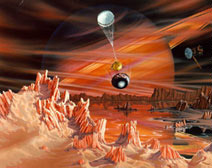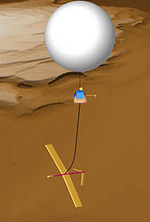Saturday, 28 February 2004
School: irrelevant and constricting
 The recurring debate on whether girls are better performers at school than boys has received some fresh input with the publication of American researchers William Draves and Julie Coates' Nine Shift: Work, life and education in the 21st century. I was delighted to read about their conclusions.
The recurring debate on whether girls are better performers at school than boys has received some fresh input with the publication of American researchers William Draves and Julie Coates' Nine Shift: Work, life and education in the 21st century. I was delighted to read about their conclusions.
According to the authors, it is not boys who are the problem but schools. For while boys are developing the skills they will need in the "knowledge jobs" of the future, schools are still preparing students for an industrial age which is passing.
Draves and Coates say boys dropped out of school in huge numbers in the first two decades of the 20th century. Yet it was young men, experimenting with technology, who led America's manufacturing boom, especially in the automobile industry.
They say something similar is happening today: boys are into the internet and computers. They like to innovate and experiment. They "like taking risks, being entrepreneurial, being collaborative - all behaviours that lead to success in the workforce today".
 But while boys are rewarded for their behaviour in the workplace, they are punished in school because they are non-conformist, poor at listening and following instructions, and restless. This reflects my experiences of nearly 20 years of education and the feelings of many of my friends (yes, boys do have feelings).
But while boys are rewarded for their behaviour in the workplace, they are punished in school because they are non-conformist, poor at listening and following instructions, and restless. This reflects my experiences of nearly 20 years of education and the feelings of many of my friends (yes, boys do have feelings).
Schools need to do more to encourage and reward the risk-taking, innovative, technology-oriented bent of the bright boys who find the current curriculum irrelevant and constricting.
At the same time, they need to ensure all boys have the literacy, language and social skills to cope in a complex society in which many jobs will involve something other than tinkering with technology.
Tuesday, 24 February 2004
Tuesday, 17 February 2004
Titan AE
 Titan AE, life in outer space after earth (AE) was destroyed by aliens, is a movie. It's also pretty much how I feel right now, wrapping up 5 1/2 years of nerve-wracking studies, a plucked chicken waiting for Quality Control.
Titan AE, life in outer space after earth (AE) was destroyed by aliens, is a movie. It's also pretty much how I feel right now, wrapping up 5 1/2 years of nerve-wracking studies, a plucked chicken waiting for Quality Control.
That's why I have my head up in space, dreaming about the infinite freedoms of post-university life, having a hard time to think about next (realistic) moves regarding career choices and all that. Some part of me says, But it's not unrealistic, some other part of me says, Welcome to real life.
 In the mean time, I am living a shared dream with my dear cousin Jon about doing business in space, if not right now, then later on for sure. Without telling too much, he might have an opening in the industry. It goes without saying, I'm a wee bit jaelous. But then, so do I! (I might have blown it by refusing to turn up for the interview, claiming my exams).
In the mean time, I am living a shared dream with my dear cousin Jon about doing business in space, if not right now, then later on for sure. Without telling too much, he might have an opening in the industry. It goes without saying, I'm a wee bit jaelous. But then, so do I! (I might have blown it by refusing to turn up for the interview, claiming my exams).
Meanwhile, I've sent my application to work as a civie in Iraq - I read in the WSJ that there great need for cool-headed workers and the pay is attractive, and I'm really looking for action after living in the books like a rat scouting for crumbs of knowledge throughout the library for half a decade. It's the sense of meaning that I crave for, and I bet I could pretend to find some in Iraq: action is a good pretence for meaning (at least it doesn't give you time to think!).
Anyway, my cynicsm is slightly taking over (btw read this BBC article about our cynicism-driven society), it's only the learning phase effect, dear readers please forgive me!
Sunday, 15 February 2004
Of Mars and Men
 Opportunity and Spirit are continuing their scientific work on Mars and sending back stunning pictures and their discoveries. After overcoming some technical difficulties, both probes are now fully operational. The picture shows a colour-enhanced rock, highlighting the spherules covering the outcrop's surface near Opportunity.
Opportunity and Spirit are continuing their scientific work on Mars and sending back stunning pictures and their discoveries. After overcoming some technical difficulties, both probes are now fully operational. The picture shows a colour-enhanced rock, highlighting the spherules covering the outcrop's surface near Opportunity.
Some issues intrinsic to Mars' hosting environment still represent challenges for the mission, such as the effects of extreme cold while the sun is not exposing the probes, or manoeuvering the probes on a sand-covered slope to counter the effects of drifting.
All this is fascinating to me. As I was walking home a few nights ago, I could see Mars bright in the sky and realised that 2 human probes were at work on the planet's surface under the watchful eye of a few orbiting satellites. Of all people walking home that night, I think I was the only one impressed.
 Another project for a mission to Mars is the Nasa-funded StratoSail. Like weather balloons, the StratoSail could carry cameras and gadgets to spot potential areas for human missions.
Another project for a mission to Mars is the Nasa-funded StratoSail. Like weather balloons, the StratoSail could carry cameras and gadgets to spot potential areas for human missions.
In theory, the balloon could be steered for months in Mars' atmosphere. The low cost of the balloon, low energy consumption and versatile operation makes it a very attractive project. However, issues of manoeuverability in strong wind currents still represent a challenge. Something to follow...
 The Huygens probe to Titan is currently hurtling through space attached to another spacecraft, Cassini. Launched in 1997, they will arrive at Saturn on 1 July this year. Cassini will spend four years in orbit around the giant planet, and when it approaches Titan next January, it will release the little Huygens for its trip down to the surface.
The Huygens probe to Titan is currently hurtling through space attached to another spacecraft, Cassini. Launched in 1997, they will arrive at Saturn on 1 July this year. Cassini will spend four years in orbit around the giant planet, and when it approaches Titan next January, it will release the little Huygens for its trip down to the surface.
The probe, a joint mission between the US and European space agencies, will focus on the oily oceans of methane and ethane which researchers believe cover much of the surface. The mission will help better understand the physics of climate change and oceans.
 Finally, closer to Earth, Switzerland is slowly making up its mind whether to join the ESA's Galileo project, a European satellite positioning system to compete against the US GPS.
Finally, closer to Earth, Switzerland is slowly making up its mind whether to join the ESA's Galileo project, a European satellite positioning system to compete against the US GPS.
Unlike the American model, the European system will be controlled by a civilian body and will not suffer from signal restrictions, allowing it to give highly precise positioning in time and space. Despite being controlled by civilians, Brussels has not ruled out military applications for Galileo.
The European Commission recently announced that its space projects would be closely linked to a possible EU security and defence force. Galileo would enable EU forces to monitor the movement of troops and munitions.
Thursday, 12 February 2004
learn-economics
As I was walking with a friend back into the library, we saw another friend standing still besides the door, holding a mobile phone to his ear, a patient yet resolute expression on his face. As he was completely silent, seemingly a prisoner of his interlocutor, the friend told him: "You're not saying anything?" I added: "Is that a girl on the phone?"
He hushed us: "It's my mother!" - and carried on "Nothing Mum, keep talking!"
Library learning is slowly turning me into a nerd - and the after-effects of months of pre-exam stasis are being felt by many here. For example, I'm greatly looking forward the highlight of the day, my daily game of Cannon (www.yoyota.ch), shooting at other friends posted in front of computers across the library. Try it, it's great fun!
This is learn-economics - or the art of motivating oneself to keep learning, to keep at it until it's all over!
Wednesday, 4 February 2004
Aurora
 "We need to go back to the Moon before we go to Mars. We need to walk before we run," Dr. Franco Ongaro, who heads the ESA's Aurora programme for long-term exploration of the solar system, said at a meeting of Aurora scientists in London.
"We need to go back to the Moon before we go to Mars. We need to walk before we run," Dr. Franco Ongaro, who heads the ESA's Aurora programme for long-term exploration of the solar system, said at a meeting of Aurora scientists in London.
The ESA has planned two flagship missions to Mars - ExoMars would land a rover on the planet in 2009, and Mars Sample Return would bring back a sample of the Martian surface in 2011-2014.
 Other test missions will include an unmanned version of the flight that would eventually carry astronauts to Mars to demonstrate aerobraking, solar electric propulsion and soft landing technologies.
Other test missions will include an unmanned version of the flight that would eventually carry astronauts to Mars to demonstrate aerobraking, solar electric propulsion and soft landing technologies.
A human mission to the Moon, proposed for 2024, would demonstrate key life-support and habitation technologies, as well as aspects of crew performance and adaptation to long-distance space flight.
ESA Aurora Programme
Sunday, 1 February 2004
From STS-107 to space tourism regulations
 On Saturday, 1 February 2003, I went into town to meet a friend and we had lunch together. We spent much time chatting about many things, discussing many ideas and enjoying each other's company. I thorougly enjoy such conversations and they have been a highlight of my studies here in St. Gallen. Discovering interesting personalities and challening each other's ideas over a nice lunch. After the roughly 4 hours that lasted the lunch, we parted and I rushed home to watch the post-mission interview and landing videos of STS-107.
On Saturday, 1 February 2003, I went into town to meet a friend and we had lunch together. We spent much time chatting about many things, discussing many ideas and enjoying each other's company. I thorougly enjoy such conversations and they have been a highlight of my studies here in St. Gallen. Discovering interesting personalities and challening each other's ideas over a nice lunch. After the roughly 4 hours that lasted the lunch, we parted and I rushed home to watch the post-mission interview and landing videos of STS-107.
As I connected to NASA TV and launched my web browser, I got CNN's breaking news e-mails, stating, "NASA loses communication with space shuttle Columbia shortly before scheduled landing" and a few minutes later, "Space shuttle Columbia breaks up over Texas. Residents urged to stay away from debris". I then saw the early pictures of the debris as the massive recovery operation was set in motion.
I always watched the space missions as much as I can, especially during the EVAs or spacewalks. I was there when Jim Voss dropped a tool in the void by accident. I watched them often relax for a few minutes before reentering the ISS, contemplating Earth with their perspective. The astronauts' awe and joy was contageous and I shared in their wonder at our planet's beauty from above.
 This time, the astronauts had died. I vaguely remembered Challenger in 1986 because at that time, I was in my Dad's office (I was 6) and a colleague had given me a miniature Shuttle to play with while waiting for my Dad to come back. This time, having followed the latest misisons so closely, I felt the loss personally and watched Ron Dittemore for his daily news briefing he gave for a week.
This time, the astronauts had died. I vaguely remembered Challenger in 1986 because at that time, I was in my Dad's office (I was 6) and a colleague had given me a miniature Shuttle to play with while waiting for my Dad to come back. This time, having followed the latest misisons so closely, I felt the loss personally and watched Ron Dittemore for his daily news briefing he gave for a week.
Today, America is embarking on an ambitious space programme focusing nearly exclusively on manned spaceflight, as the ESA and space agencies in other nations are talking about further manned space missions. On Friday, the World Street Journal Europe published an article on its front page about the Federal Aviation Administration and US lawmakers working on regulation for commercial space tourism, facing multiple commercial projects and initiatives such as X-Prize. When the state starts regulating, it means the issue is already well under way.
X-Prize is a $10 million competition to develop small, privately funded reusable launch vehicles. The aim is the build what in many ways are scaled-down, greatly simplified cousins of the space shuttle. Most will take off and land like traditional airplanes, but received an additional boost from some type of rocket.
Issues under regulation are permits to start testing reusable spacecraft, required training programmes for crew members and necessary insurance and waivers. The future of space tourism is taken seriously by the US government. After last year's tragedy of STS-107, one can only hope that beyond the broad vision, reorganisation of NASA and talks of regulation, we will have the discipline of getting things done - beyond presidential elections or other particular interests.

Rose.ph is where Philippe Rose blogs. One day I'll have my office on the Moon (in Borneo for now).

2011: January,
February,
March,
April,
May,
June
2010: January,
February,
March,
April,
May,
June,
July,
August,
September,
October,
November,
December
2009: January,
February,
March,
April,
May,
June,
July,
August,
September,
October,
November,
December
2008: January,
February,
March,
April,
May,
June,
July,
August,
September,
October,
November,
December
2007: January, February, March, April, May, June, July, August, September, October, November, December
2006: January, February, March, April, May, June, July, August, September, October, December
2005: January, February, March, April, May, June, July, August, September, October, November, December
2004: January, February, March, April,
May, June, July, August, September, October, November, December
2003: December
| February 2004 |
| S | M | T | W | T | F | S |
| 1 | 2 | 3 | 4 | 5 | 6 | 7 |
| 8 | 9 | 10 | 11 | 12 | 13 | 14 |
| 15 | 16 | 17 | 18 | 19 | 20 | 21 |
| 22 | 23 | 24 | 25 | 26 | 27 | 28 |
| 29 | | | | | | |


♫ Breed 77 ~ The Game
♫ Bullet For My Valentine ~ All These Things
♫ Creed ~ What If
♫ Matchbook Romance ~ Portrait
♫ Rise Against ~ Prayer Of The Refugee
♫ Silverstein ~ Giving Up
♫ William Shatner ~ Common People
♫ Wonderland Dementia ~ Hypnosis

Coup De
P-Manzh
Kottke.org
Indymedia
Dart Center
GMAT surfer
Registan.net
Ferghana.Ru
Disinfopedia
Ethereal Code
WorldChanging
Andrew Sullivan
Magnetic Kid Liv
David Brooks NYT
the 2011 bloggies!
Talking Points Memo
Questionable Content
Genferin und St Gallerin
�#Blogging Brits?�
"&
.?
.blog.domain
.#
.>

Philippe Rose
Running Greymatter | RSS
 The recurring debate on whether girls are better performers at school than boys has received some fresh input with the publication of American researchers William Draves and Julie Coates' Nine Shift: Work, life and education in the 21st century. I was delighted to read about their conclusions.
The recurring debate on whether girls are better performers at school than boys has received some fresh input with the publication of American researchers William Draves and Julie Coates' Nine Shift: Work, life and education in the 21st century. I was delighted to read about their conclusions. But while boys are rewarded for their behaviour in the workplace, they are punished in school because they are non-conformist, poor at listening and following instructions, and restless. This reflects my experiences of nearly 20 years of education and the feelings of many of my friends (yes, boys do have feelings).
But while boys are rewarded for their behaviour in the workplace, they are punished in school because they are non-conformist, poor at listening and following instructions, and restless. This reflects my experiences of nearly 20 years of education and the feelings of many of my friends (yes, boys do have feelings).


 In the mean time, I am living a shared dream with my dear cousin
In the mean time, I am living a shared dream with my dear cousin 
 Another project for a mission to Mars is the Nasa-funded StratoSail. Like weather balloons, the StratoSail could carry cameras and gadgets to spot potential areas for human missions.
Another project for a mission to Mars is the Nasa-funded StratoSail. Like weather balloons, the StratoSail could carry cameras and gadgets to spot potential areas for human missions. The
The  Finally, closer to Earth, Switzerland is slowly making up its mind whether to join the
Finally, closer to Earth, Switzerland is slowly making up its mind whether to join the  "We need to go back to the Moon before we go to Mars. We need to walk before we run," Dr. Franco Ongaro, who heads the
"We need to go back to the Moon before we go to Mars. We need to walk before we run," Dr. Franco Ongaro, who heads the  Other test missions will include an unmanned version of the flight that would eventually carry astronauts to Mars to demonstrate aerobraking, solar electric propulsion and soft landing technologies.
Other test missions will include an unmanned version of the flight that would eventually carry astronauts to Mars to demonstrate aerobraking, solar electric propulsion and soft landing technologies.  On Saturday, 1 February 2003, I went into town to meet a friend and we had lunch together. We spent much time chatting about many things, discussing many ideas and enjoying each other's company. I thorougly enjoy such conversations and they have been a highlight of my studies here in St. Gallen. Discovering interesting personalities and challening each other's ideas over a nice lunch. After the roughly 4 hours that lasted the lunch, we parted and I rushed home to watch the post-mission interview and landing videos of STS-107.
On Saturday, 1 February 2003, I went into town to meet a friend and we had lunch together. We spent much time chatting about many things, discussing many ideas and enjoying each other's company. I thorougly enjoy such conversations and they have been a highlight of my studies here in St. Gallen. Discovering interesting personalities and challening each other's ideas over a nice lunch. After the roughly 4 hours that lasted the lunch, we parted and I rushed home to watch the post-mission interview and landing videos of STS-107. This time, the astronauts had died. I vaguely remembered Challenger in 1986 because at that time, I was in my Dad's office (I was 6) and a
This time, the astronauts had died. I vaguely remembered Challenger in 1986 because at that time, I was in my Dad's office (I was 6) and a 
